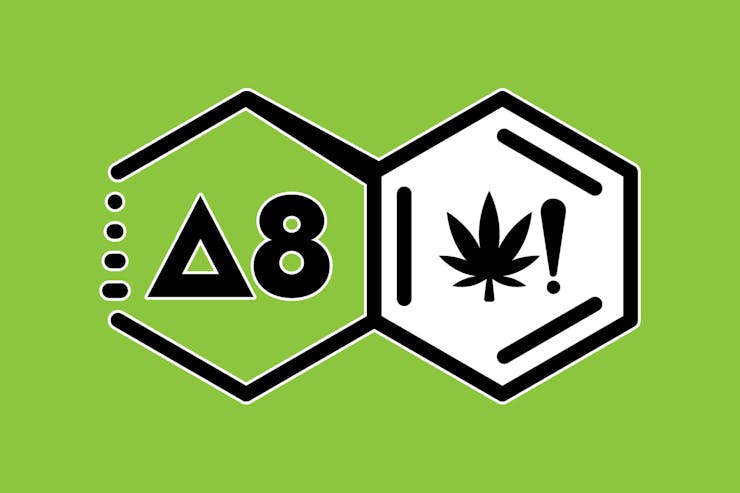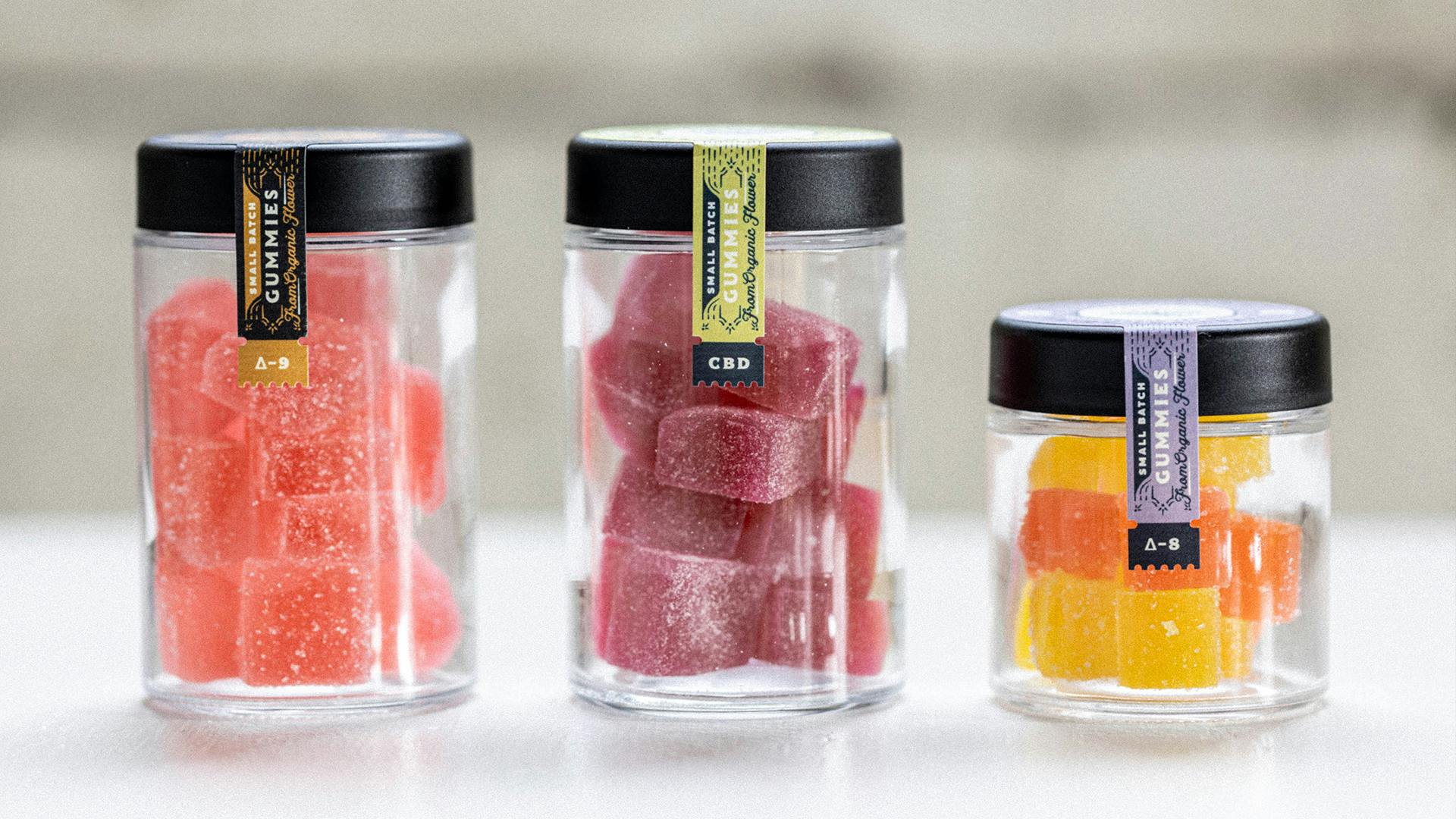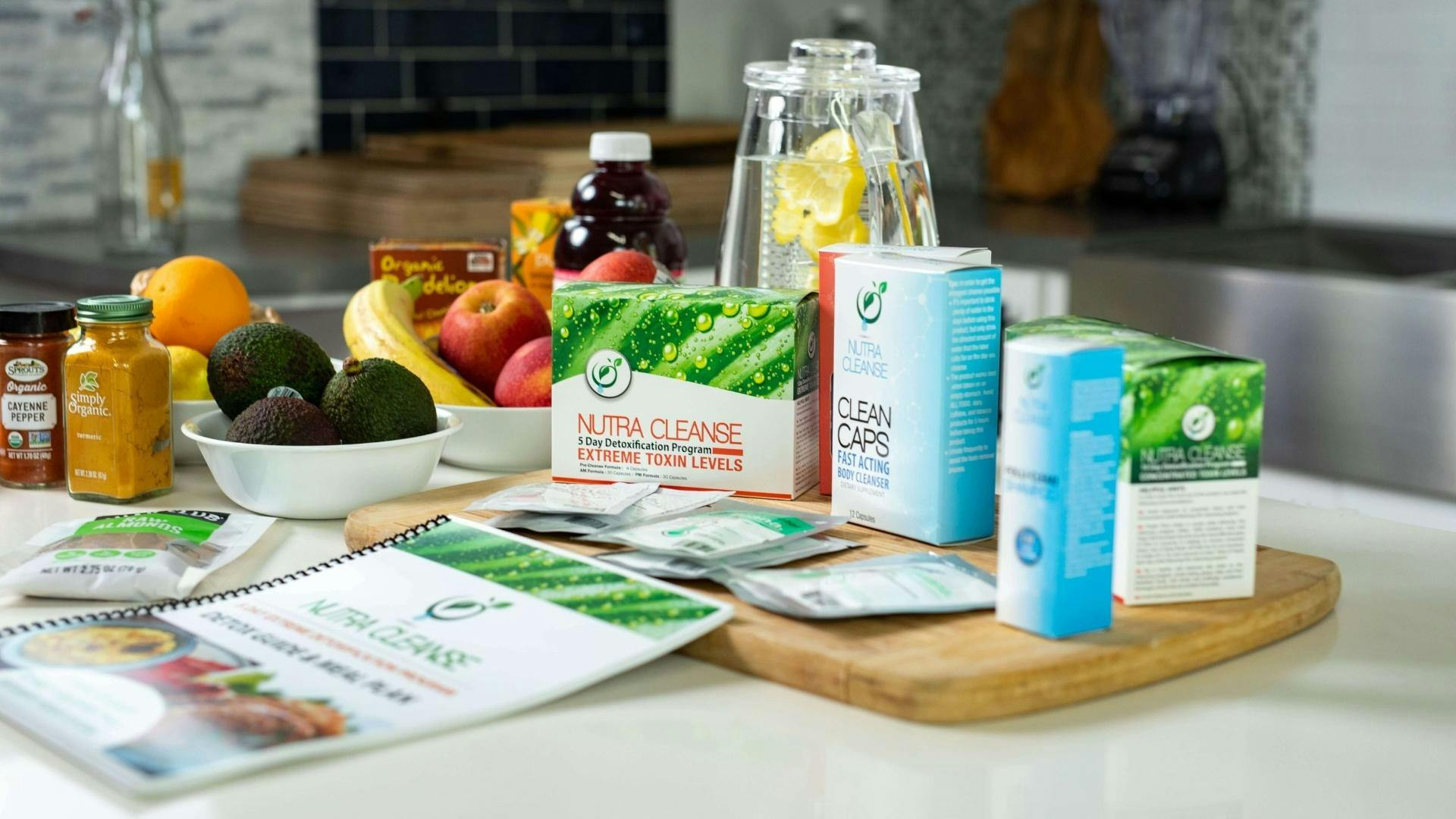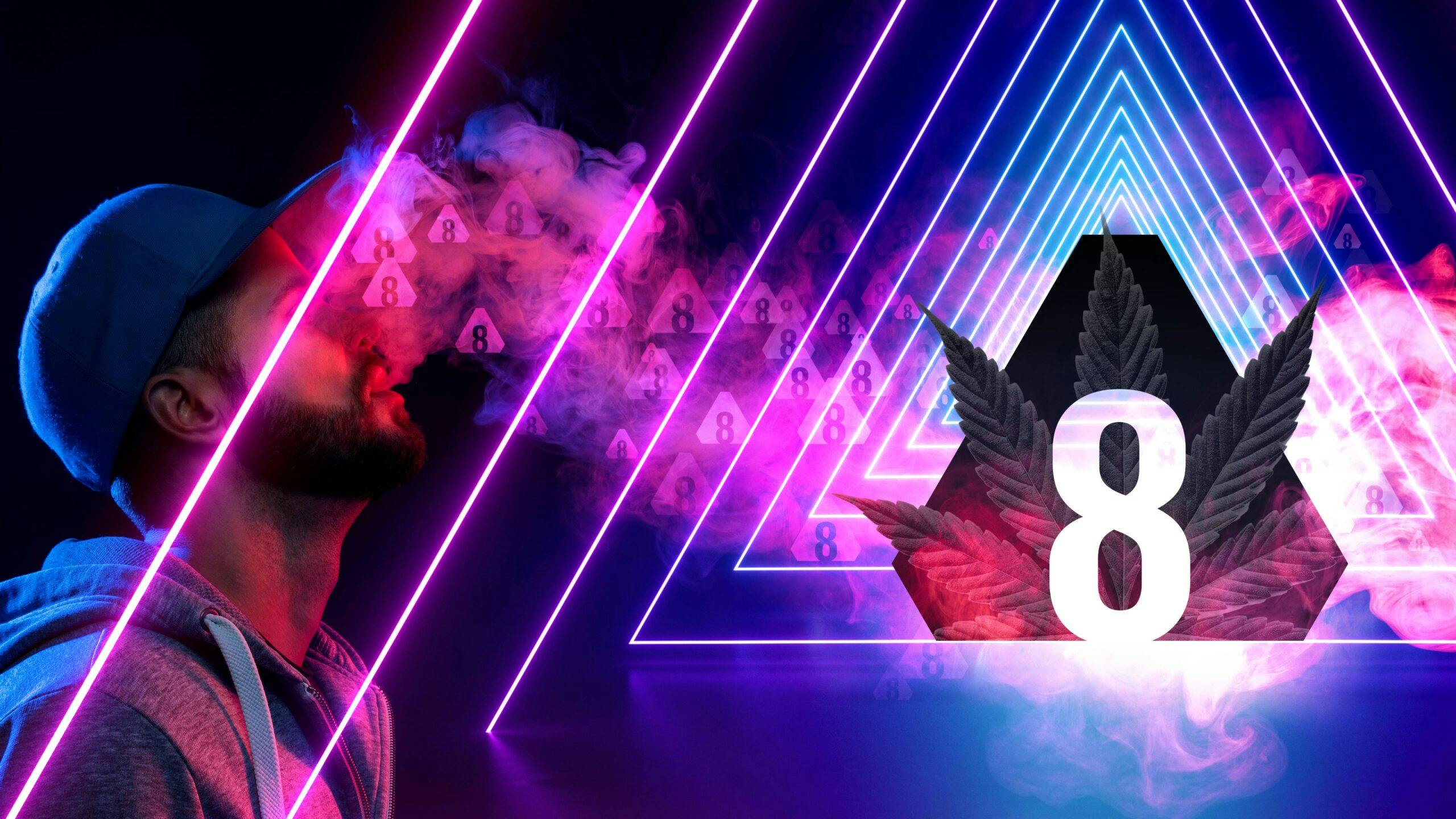There’s more to cannabis than just THC and CBD, and for the love of the entourage effect, I’m not talking about terpenes.
Delta-8-tetrahydrocannabinol (D8)—or “sketchy gas station weed” as it’s sometimes known in Farm Bill America—has made its debut on the Canadian cannabis market.
Delta-8 is part of a new category of semi-synthetic THC-like cannabis products made using plant-derived cannabinoids as precursors: You might call them plant-adjacent, phytocannabinoids twice-removed, or weed from the future.
In the U.S., Delta-8 and other semi-synthetic cannabinoids are becoming abundant in states where delta-9 THC remains federally illegal. “Delta-8 is one of many products that is sold in the US without proper regulatory oversight,” says Michael Krestell, Executive Chairman of Dynaleo, a cannabis gummy manufacturer based in Alberta.
Unlike in the U.S., delta-8 and delta-9 are mostly equal under the law in Canada; everything to do with hemp, cannabis and cannabinoids are regulated under the federal Cannabis Act.
“Canadian regulations require…extensive testing of all cannabis inputs before manufacturing, and then further extensive testing of the product once it is manufactured,” says Krestell.
Why is D8 emerging in Canada, where typical THC is legal?
Chemically and functionally speaking, D8-THC and D9-THC are very similar. D8 is a slightly less active isomer; the “8” and “9” refer to the position of carbon double bonds in their respective chemical structures, which are otherwise identical.
“Most delta-8 is produced by reacting CBD in an organic solvent and a catalyst such as a strong acid,” says Tom Ulanowski, Director of Scientific and Technical Affairs at Nextleaf Labs, a Canadian firm commercializing semi-synthetic cannabinoids.
Delta-8 produces its effects by engaging CB1 and CB2 endocannabinoid receptors in the brain and body, which are the same receptors engaged by delta-9.
“There are many gaps in the knowledge but delta-8 is a bit less potent than delta-9 and precautions for kids and pets still remain,” says Dr. Andree Néron, a pharmacist and chronic pain consultant at Sante Cannabis, a medical cannabis clinic in Quebec. “Benefits and harms may differ.”
However, D8 does not interact with endocannabinoid receptors as efficiently as D9, translating into roughly half of the biological activity of typical THC. For this reason, D8 is considered mildly euphoric and is often marketed as a “lighter version” of standard D9 THC.
@weedpro drop a comment about your experience w d8 for research purposes 🌱🌱🌱
♬ original sound – adam greenblatt (weedpro)
Dr. Néron says delta-8 comes with the same concerns as delta-9 THC as it relates to unsubstantiated therapeutic claims, as well as managing psychoactivity and intoxication in a medical context with patients.
Like its herbal counterparts, D8 and other novel cannabinoids may have therapeutic potential, but compared to THC and CBD—for which evidence is already limited—we know next to nothing.
“Consumers must be empowered with the knowledge to make their choices,” says Dr. Néron. “Patients must be protected and directed to healthcare providers familiar with cannabinoids, for education, counselling, and monitoring.”
An online survey of D8 users published in the Journal of Cannabis Research says “Delta-8 THC may provide much of the experiential benefits of delta-9 THC with lesser adverse effects,” while also noting that “future systematic research is needed to confirm participant reports.”
Indeed, rare and novel cannabinoids allow consumers to explore the space between and beyond THC and CBD—at their own risk, of course.
Both are technically THC, does D8 feel different than D9?
“Consumers may choose [semi-synthetic] cannabinoids for their potentially different psychoactive effects,” says Ulanowski. “Anecdotal accounts suggest…different effects in terms of onset, duration and strength, for every milligram consumed.”
Anecdotal evidence, aka consumers’ lived experiences, can offer insight into how delta-8 effects feel in the body compared to the more common delta-9. My own informal request for feedback on TikTok echoes Ulanowski’s analysis.
Of the 145 comments, there was a consensus that, overall, users experienced milder effects and, notably, many expressed headaches and other body aches after consumption. Not all commenters were based in Canada and we can’t say for certain if those effects were from regulated products.
Dynaleo recently launched Sunshower Solar Punch 10:1D8 gummies. It’s not their first foray into rare cannabinoids, they also sell gummies featuring cannabinol (CBN) and cannabigerol (CBG). Krestell says Dynaleo’s D8 gummies are “inspired by the idea that consumers should be able to curate their own high.”
“We believe that a flexible dose format of 10 mg delta-8 and 1 mg delta-9 per piece, with 10 pieces per bag, allows consumers to find the dose that is appropriate for them,” says Krestell.
What delta-8 products are available in Canada?
- Solar Punch 10:1 Δ8 Gummies by Sunshower
- Δ8 beverage 20:10 by Impromptu
- 24K Gold Punch D8 THC 510 Cartridge by RedPill
- Full Spectrum Delta8 Oil by RedPill
- Delta 8 Capsules by RedPill
Put another way, a 10-piece bag of Sunshower Solar Punch gummies contains the maximum allowable amount of 10 mg THC, plus 100 mg of delta-8; which at roughly half the potency is akin to an additional 50 mg of delta-9 THC.
“The [Canadian] Cannabis Regulations have specific limits on delta-9 THC content in products such as cannabis edibles and extracts, however, no such limits exist for D8 or other cannabinoids,” says Ulanowksi.
Cannabis edibles in Canada are restricted to a maximum of 10 mg THC per serving/dose and per package, ostensibly as a way to mitigate risk in case of accidental ingestion.
Consumers and cannabis companies don’t exactly love the 10 mg THC limit on edibles for restricting choice, pushing people towards illicit edibles, and increasing packaging waste.
“Reviewing the current restrictions on delta-9 THC dosage in edibles would be an important step in the evolution of the Canadian cannabis regulations,” says Krestell.
Dynaleo isn’t the only firm charting new waters with D8. Impromptu brand lists a cannabis beverage on OCS containing 20 mg delta-8 THC and 10 mg delta-9 THC—roughly twice the maximum allowable dose of THC.
Delta-8 offers a potency and price loophole in current Health Canada regulations
In addition to ingestible dose limits, delta-9 THC content is also used to calculate excise tax on cannabis extracts, which includes oils, vape carts, and concentrates. Nextleaf recently announced a vape cartridge containing THC-O-Acetate as an “Excise Tax-Free Alternative.” THC-O-Acetate is another semi-synthetic cannabinoid that uses delta-9 THC as a chemical precursor.
“The Excise Act requires that licence holders pay $0.01 for every mg of D9 THC sold in extract or edible form, however, these taxes are not applicable for D8 or THC-O,” shares Ulanowski. “This allows licence holders and consumers to sell products at a higher margin and buy at a lower cost, respectively.”
Unlike D8-THC, THC-O-Acetate and other semi-synthetic cannabinoids are considered more potent than D9-THC. Néron says efforts to circumvent restrictions on THC may “lead to undesirable consequences for consumers and patients, regarding rare/novel cannabinoids.”
“When two agents are very similar (look-alike drug names, packages, appearance, dosage) there is an associated error-related risk. We have to think about an error-reduction strategy to avoid mix-ups and the selection of the wrong product.”
Making assumptions about a drug’s safety or efficacy based on chemical similarities alone is perilous, to say the least.
“Structure-related drugs may have different pharmacological profiles, [small changes] can increase or decrease central nervous system response,” says Dr. Néron, “[Morphine and hydromorphone] are almost the same chemically, however, hydromorphone is 5-10 times more potent so we use an equivalent dosage.”
Canadian regulations specifically require that delta-9 THC and CBD content be disclosed on every package, however, this is not required for other cannabinoids. Companies like Dynaleo are proactively disclosing but are not necessarily obligated.
“Sunshower continues to utilize the same disclosure on D8 Solar Punch that it uses on all of its other adult-use gummies” with regards to cannabinoid content, says Krestell.
Ulanowski “encourage[s] all producers to test and label their products accordingly, so that consumers are aware of what they are ingesting,” which he says “is especially important in the context of non-THC and CBD cannabinoids, where consumers may not have much experience.”
Considering these products didn’t even exist until a few years ago, it’s safe to say consumer experience is next to nil. Never in history have such doses and dosage formats been so widely available to such large swaths of people. Despite the knowledge gaps, cannabinoids are still toxicologically low-risk next to other popular plant substances.
“I suspect that regulators are closely monitoring such products, and may propose some additional regulations… if they believe these minor/novel cannabinoids pose a risk to public health,” says Ulanowski.








